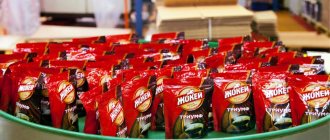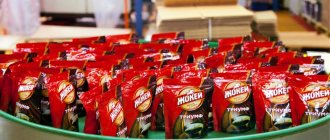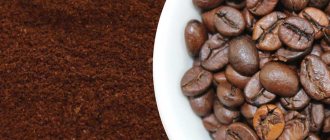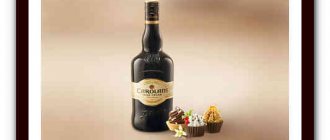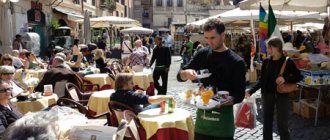Vending coffee machines, designed for the automatic sale of aromatic drinks, are known to everyone who loves delicious coffee at an affordable price.
Hot vending coffee is available at any time of the day and is ready in a matter of minutes, which especially attracts many consumers.
In addition, such devices are a good way to earn money for entrepreneurs , because from year to year the popularity of equipment capable of brewing a coffee drink that tastes great is growing noticeably.
Page navigation:
Coffee shop formats
A coffee shop can come in various formats. The type of establishment determines the target audience, pricing policy, variety of drinks offered and even the quality of the product. The most common types of coffee shops are:
- Kiosks;
- Auto-coffee shops;
- Vending establishments;
- Full-fledged establishments in the format of a small cafe.
Opening a coffee shop in the form of a kiosk requires the least financial costs. The establishment can be opened in places with the greatest concentration of people, for example, in parks, squares, near shopping centers. Opening a kiosk does not require a large package of documents, and the rent is quite low. However, there are also disadvantages. The main one is the limited selection of drinks and menu.
An auto-coffee shop is similar in format to a kiosk, but to organize it you will need a specially equipped vehicle - a food truck. In this case, it is necessary to include the costs of maintenance, storage and repair of the car. When organizing a drive-thru coffee shop, the approval process is simpler; renting a kiosk is not required; in Russia, you need to rent a place. However, as in the case of a kiosk, such establishments offer a rather meager menu, and it can be problematic for the owner to control the quality of the employees’ work.
Self-service vending coffee shops require the installation of automatic machines. Typically, the complex purchases equipment for preparing coffee drinks and selling snacks. Vending cafes require regular maintenance. But at the same time, the number of required personnel is significantly less, which allows you to automate the business. However, this format has significant disadvantages:
- Vending machines are quite expensive;
- They require qualified maintenance;
- Long payback period when installing a small number of devices or choosing the wrong location.
Organizing a full-fledged coffee shop is one of the most expensive, but at the same time profitable formats. However, at the start, large investments will be required to purchase equipment, rent and decorate the premises. Additionally, you will need to hire qualified employees or train workers yourself. It is also necessary to prepare a large volume of permits.
conclusions
When choosing a vending coffee machine, first of all you need to compare your financial capabilities and the needs of potential consumers , and also take into account that:
- the profit from an installed machine for brewing and selling coffee directly depends on its location;
- machines that prepare drinks from instant coffee are inferior to devices designed for brewing coffee from freshly ground beans;
- A modern vending machine must be equipped with a touch screen and a self-diagnosis system for faults.
Coffee shop equipment
Regardless of the format of the establishment, you will need to purchase a minimum set of equipment. It comes down to:
- Coffee machine;
- Coffee grinder;
- Water tanks and water treatment systems;
- Trade equipment.
Professional coffee machines
A coffee machine is the main equipment for a coffee shop. The operating principle of the device is relatively simple: compressed ground coffee is processed with steam. The range of drinks and their taste depend on the quality and performance of the equipment. The most popular brands are Franke, Nuova Simonelli, Rancilio, Futurmat R, Faema.
Coffee shops can offer not only drinks from coffee machines, but also those prepared in a Turk. Coffee on sand is a drink for real coffee gourmets. It has a bright rich taste. To prepare coffee on sand, special installations called hovoli are used. They are containers with heating elements into which quartz sand is poured. After it has warmed up, a Turk is buried in it, in which the drink is prepared. Due to the fact that not only the bottom of the vessel is heated, but also its walls, extraction occurs in the most optimal way, which has a positive effect on the taste of the finished coffee.
Professional coffee grinders
The choice of coffee grinder is no less important. Professional equipment mainly includes millstone-type devices. The working element can be flat or conical. Grinding in coffee grinders with flat burrs is considered more uniform. Ground coffee can be fed directly into the holder or hopper. Low-productivity machines are equipped with a holder; it is assumed that the barista will wind the beans in advance. Coffee storage containers are equipped with blades for mixing and breaking lumps. When you feed ground coffee directly into the holder, it does not oxidize. Additionally, coffee grinders can be equipped with a dispenser and a timer.
Water treatment systems
The quality of coffee drinks largely depends on the quality of water.
Professional coffee grinders have a mechanism for precise grinding adjustment. To prepare espresso, finely ground powder is used. For the Turks - ultra-thin.
Kiosks and food trucks usually use containers with pre-purified water. In stationary institutions, a centralized water supply system is used. However, using tap water is prohibited. An installation is needed for purifying and softening water; it removes metals, heavy salts and harmful impurities, which not only reduce the quality of drinks, but also form scale in the thermostat units of coffee machines. For coffee shops, water purification systems of the Atoll, EcoWater, Ecosoft, and Canature brands are used. For additional water purification, it is best to use fine filtration systems without reverse osmosis.
Retail store equipment
To expand the assortment of the establishment, you will need commercial equipment. Its list depends on the type of establishment. To organize trade you will need a counter or bar counter. In food trucks and stalls this need is eliminated due to the design.
To sell baked goods (donuts, croissants, etc.) you will need a thermal showcase. The equipment can be desktop or floor-mounted. The internal chamber maintains a constant temperature, which allows you to keep the products warm and fresh for a long time. Most models are additionally equipped with a backlight system, which allows customers to better see the product.
To sell cold drinks you will need a refrigerated display case. It is usually made in the form of a cabinet with a glass facade. The required temperature is maintained inside. Refrigerated display cases are also equipped with lighting.
Types and degree of roasting of coffee
The taste of the prepared coffee is determined not only by the equipment used, but also by the quality of the raw materials used, that is, the coffee beans. Only two types of coffee are grown on an industrial scale in the world:
- Arabica - it accounts for about 70%; the Arabian tree grows on mountain plantations. The grains have an oblong shape and a smooth surface; they contain a large amount of aromatic oils, which gives the finished drink a slight sourness.
- Robusta - its production volume occupies about 30%; the Congolese tree is grown on the plains. The grain has a less intense aroma. However, the caffeine content in Robusta is twice that of Arabica. The taste lacks characteristic sourness, the grains are more bitter.
Most blends are prepared based on two types of coffee. Arabica is mainly responsible for the flavor tones; Robusta adds strength, richness and a special bitterness to the drink. In addition, when preparing coffee from a mixture with Robusta, a more stable, high foam is obtained. This is why this variety is added to espresso blends.
Arabica blends come in a variety of flavors. They depend on the climate in which the plant grows, the technology for processing green grains, the degree of roasting, and so on. Moreover, the higher the coffee tree grows, the denser the berry, as well as the richer the taste, the more varied the sour note. To highlight any bright flavor shades in the finished coffee, single-origin coffees are used. This term refers to a coffee blend that contains beans collected from one plantation of one harvest. Since they were grown under the same climatic conditions, the grains have the same pronounced taste. Mostly single varieties are produced on the basis of Arabica. Thus, mixtures grown in Brazil are distinguished by notes of cocoa and roasted nuts. Single varieties from Jamaica are distinguished by a light berry sourness. Coffee of Kenyan, Mexican or Ethiopian origin has a more pronounced sour taste.
The taste of the finished drink is affected not only by the type of grain, the ratio of varieties in the mixture, but also by the degree of roasting. It is indicated by markings on the package in the form of numbers from 1 to 5:
- The first or Scandinavian degree is the lightest, the beans have a light brown tint, are characterized by maximum caffeine content and bright sourness;
- The second or American degree is medium in intensity, the grains are brown in color, the taste is slightly bitter;
- The third or Viennese is an intensive roasting, the grains acquire a dark brown hue and a sweetish taste;
- Fourth or French degree - intensive roasting until chocolate color, the drink acquires a rich, thick taste and tart aroma;
- The fifth (Italian) is considered an extreme degree of roasting, the beans acquire a special oily sheen, and the drink has an aromatic, bitter taste.
Coffee selection
Coffee shops do not use ordinary bean coffee. The choice is determined by the concept, format and pricing policy of the establishment. So-called commercial or specialty coffee beans can be used for preparation. Let's figure out how they differ.
Specialty is coffee that can be completely traced back to its pedigree, from the tree to the finished drink. In this case, it is known exactly where and under what conditions the grains grew, when they were collected, how they were evaluated, roasted and packaged. These coffee beans have a distinct taste and are virtually free from defects. The grains are double checked. The International Specialty Coffee Association SCA and the Coffee Quality Institute define the flavor profile and requirements for specialty beans. First of all, the grains should not have any defects (chips, cracks). The number of grains with defects should not exceed 5%. Taste qualities are determined by tasters on a scale of 100 points. Specialty must receive a score of at least 80. In this case, the beans are usually light or medium roasted. At the same time, commercial-grade coffee is usually darker, as manufacturers try to hide flavor defects with the level of roasting.
Commercial coffee is intended for mass sale. This does not mean that it is of low quality. Commercial coffee can be tasty and aromatic. However, his bouquet will be more modest than for specialty. Among commerce, it is customary to distinguish a special subspecies “Fine commercial”; in this case, coffee was grown as a specialty coffee, but the climatic conditions failed.
The choice of coffee is determined by the concept of the establishment. Specialty coffee is expensive; only connoisseurs and true connoisseurs can appreciate it. However, if the establishment is still aimed specifically at amateurs. With the proper quality of drinks and assortment, the coffee shop will quickly acquire a permanent, loyal audience.
Our online store offers a wide range of professional equipment for coffee shops of various formats. The catalog contains coffee machines, coffee grinders, and necessary accessories. If necessary, experienced consultants will help you select equipment with the required technical characteristics and the desired price category.
General concept of a coffee machine for home
Coffee machines were designed for professional baristas working in cafes and restaurants, but due to their simple design and convenience, they began to be sold for home use.
The household version of the device is slightly cheaper than industrial ones. Often coffee machines are produced with artificial intelligence that controls the brewing process.
Benefits of use
These devices have a number of advantages:
- The ability to prepare a delicious drink without knowing the characteristics of coffee.
- Low cost of ingredients.
- Wide range of functions.
The coffee machine allows you to prepare a delicious drink without knowing the characteristics of coffee.

